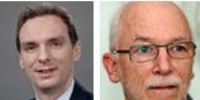Tax Policies that Might Work

A Discussion with Professor Mihir Desai of Harvard Business School, Professor Michael Graetz of Columbia Law School & Andrew Stern of the Richman Center (Moderated by Jesse Greene)
- 6:15pm-7:45pm Columbia Law School, JGH 103
The Internal Revenue Code of the United States is acknowledged to be overly complex, inequitable, and inhibiting to economic growth. There is consensus on the need for “change” but no consensus on its content. Some propose to raise taxes on higher income taxpayers. Others want to restructure the code, removing tax deductions and credits while lowering rates for corporations and individuals. Still others insist that we should use consumption taxes more and income taxes less. This discussion will explore tax policies that may boost economic growth, increase tax revenues and create desirable incentives for US taxpayers better than the current tax structure. Join us for this important exploration of what tax policies we should consider.
September 19, 2012
The Economic Consequences of Inaction on Taxation and Government Expenditures Post the U.S. Presidential Elections

A Discussion with Peter Orszag, Vice Chairman of Global Banking at Citigroup and former Director of the Office of Management and Budget (Moderated by Jesse Greene)
- 6:15pm-7:45pm Columbia Business School, Uris 142
The U.S. economy stands at a cross-road, still recovering from the financial crisis but also facing the looming fiscal cliff at the end of this year. Peter Orszag will analyze the state of the economy and our polarized political system. He will also discuss pathways forward to get past the fiscal cliff and to achieve more rapid economic growth.
October 2, 2012
The Future of American Workers

A Discussion with Professor Erik Hurst of University of Chicago Booth School of Business and Jesse Greene, Senior Fellow at the Richman Center and member of the Board of Directors at Caterpillar, Inc.
- 6:15pm-7:45pm Columbia Business School, Uris 142
Experts argue that the economy has not experienced a significant rebound as in the past because low skilled manufacturing jobs have predominantly gone to low wage countries. This phenomenon, coupled with the delayed housing recovery and the continuing advance of technology and process efficiency at home, play an important part in explaining the lag in recovery of jobs in the U.S. economy. Our experts discuss the prospects for low skilled workers and what the U.S. must do to remain competitive.
November 13, 2012
Achieving Energy Independence for North America

A Discussion with Colin Davies, Vice President of Corporate Planning and Strategy at Hess Corporation and Professor Geoffrey Heal of Columbia Business School (Moderated by Jesse Greene)
- 6:15pm-7:45pm Columbia Business School, Uris 142
With recent discoveries of natural gas in the US, the new oil finds in North Dakota, the advances in “Fracking” technology to extract oil and gas, plus the resources in the oil sands in Canada, some now say it is possible for North America, and maybe the US, to be energy independent in 10 years.
This discussion will first explore the facts as to whether this is possible, covering both the identified reserves and actions underway by the oil industry. We will then discuss what government policies need to be implemented to get the best outcome, and the economic advantage it may provide to the US. Finally, we will explore whether we should strive for independence or use someone else’s energy first.
November 27, 2012
The Nature of Work in the US Today and Tomorrow

A discussion with Carl T. Camden, President and CEO of Kelly Services, Inc. and Andrew L. Stern, Ronald O. Perelman Senior Fellow at the Richman Center)
- 6:15pm-7:45pm Columbia Business School, Uris Hall 141
The recession is ending but unemployment remains high. Part time jobs, consulting assignments and other temporary forms of employment are growing. The structure of work in the US is changing. Long term positions with one employer are declining and employees can expect to have many employers over their careers. What are the implications for business, labor and society in general? What is driving this change? Is technology improving productivity but reducing the number of jobs available? Is the shift to knowledge work from manufacturing creating fundamental change? Can worker training get people back to work and who will pay for this? Our experts explored these questions, and enlightened us with their experience and knowledge of the structure of work in the US and its direction.
February 4, 2013
Cyber Threats and Cyber Security

A Discussion with Judith Germano, Chief of Economic Crimes, U.S. Attorney's Office for the District of New Jersey, Brendan Hannigan, General Manager, IBM Security Systems and Matthew Waxman, Professor of Law and Faculty Co-Chair, Roger Hertog Program on Law and National Security (Moderated by Jesse Greene)
- 6:15pm-7:45pm Columbia Business School, Uris Hall 141
Secretary of Defense, Leon Panetta, has noted the significant risk of a cyber attack on our systems and infrastructure. How big is this? How has the nature of this threat changed? Is technology evolving to meet the challenge? What are the legal issues surrounding this threat? What does this really mean for government policies and what can, and what is, our government doing about this? What is the impact of all of this on your legal rights, such as privacy? With the help of our experts we plan to learn about these issues, and more.